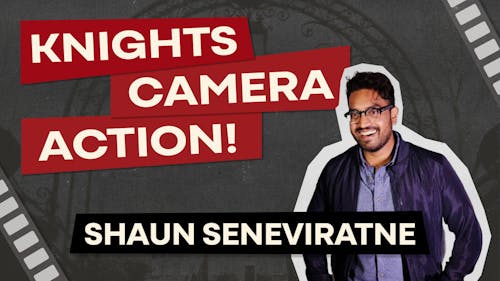Knights, Camera, Action: Shaun Seneviratne

Shaun Seneviratne, an up-and-coming independent filmmaker, recently had his debut feature, "Ben and Suzanne, A Reunion in 4 Parts," premiere at South by Southwest (SXSW), a national festival and conference in Austin, Texas. It's a slow-burn romance, centered around a couple's struggle with coming together after being long distance for so long.
The film's naturalistic style holds a gritty realness, all the characters feel lived in, like specific people you might know in your life. Alongside the terrific acting is stunning cinematography, with powerful compositions that never distract from the character's dialogues.
The impressive craftsmanship can be credited not only to the skills he acquired during his tenure at Rutgers but also to the subject matter itself — the movie is inspired by his own love life.
The Daily Targum sat down with Seneviratne to discuss how his time at Rutgers influenced his film career, and what the innovations of technology could mean for the industry.
Despite his eventual pursuit into filmmaking, during his collegiate years, his dreams were complicated by Rutgers' lackluster resources — students wouldn't be able to major in digital filmmaking until 2015.
"There wasn't a film program," he said. "I didn't touch a camera until 2009, and the first thing I ever made was a 'Happy Birthday' video for that girlfriend living abroad."
Instead, he decided to minor in cinema studies and major in marketing and journalism. While he wasn't able to completely indulge in film to the extent that he wanted, he found other avenues to express his creativity. Studying film, as opposed to making it, also helped inform his style.
"I think anything else we learn outside of filmmaking always benefits because it gives us a different perspective on things," he said. "So I mean, through my journalism degree, I was the president of the Rutgers Review … I was super involved with that, I was much more heavy into music. So, I was always in the arts."
Beyond the Rutgers Review and classes, Seneviratne was also involved in the underground New Brunswick music scene — his hardcore band Rapid Cities deeply impacted his process to film.
"I think, being in that scene and that sort of art world and space was super foundational, because it's, again, all the stuff that affects the way you do things and the way you think about the world," he said.
This is evident in his filmography, which delves into an experimental aesthetic. Even with its vibrant characters and gorgeous depiction of Sri Lanka, "Ben and Suzanne" has this feeling of individuality, and this shows in the storytelling. Instead of a punk look, it goes for a punk spirit.
Within the classroom, a professor in the Department of Cinema Studies, Albert Nigrin, and his film co-op program left a major impression, introducing Seneviratne to artistic filmmaking.
"Nigrin showed me some movies, like this cult film class that I took as a summer class that blew my mind," he said. "And, I don't know, just like that exposure to like an art cinema was foundational."
In this new digital era where filmmaking can be done by anybody, Seneviratne believes there's a point where the art form loses some of its impact. He acknowledges how it's created opportunities for young aspiring filmmakers, but it's led to some problematic issues within mainstream and streaming media.
"I call Hulu like 'millennial Hallmark,'" he said. "Like you watch these movies on Hulu, and then it cuts to the pharmacy commercial, and they look exactly the same."
This connects back to his nonconformist approach to film — characters are funny, dynamic, friendly and lifelike. His debut makes the camera and audience sit and observe. This breath of simplicity is hardly seen nowadays, but it's a warm welcome to the world the film presents.
With an ignited passion, inspired by his time at Rutgers, Seneviratne is truly a new voice to the filmmaking landscape and has an adaptability perfect for the medium. He lives and breathes cinema, innovating and teaching.
"Ben and Suzanne, a Reunion in 4 Parts" shows that more than any conversation could.
Seneviratne is currently teaching at the Brooklyn STEAM Center and Pace University, helping the next generation of filmmakers find their voice and grapple with this tough, unwieldy industry.



